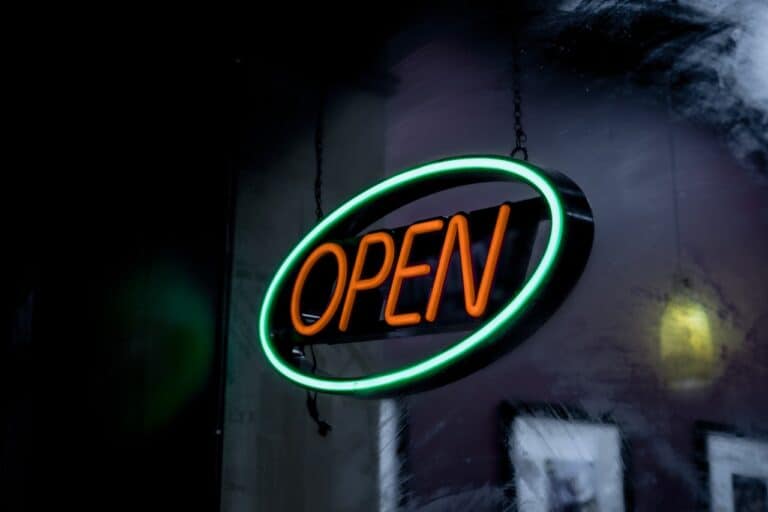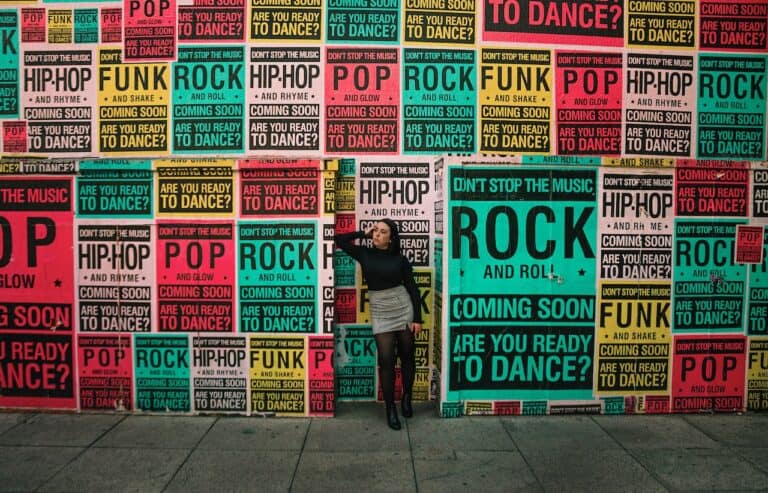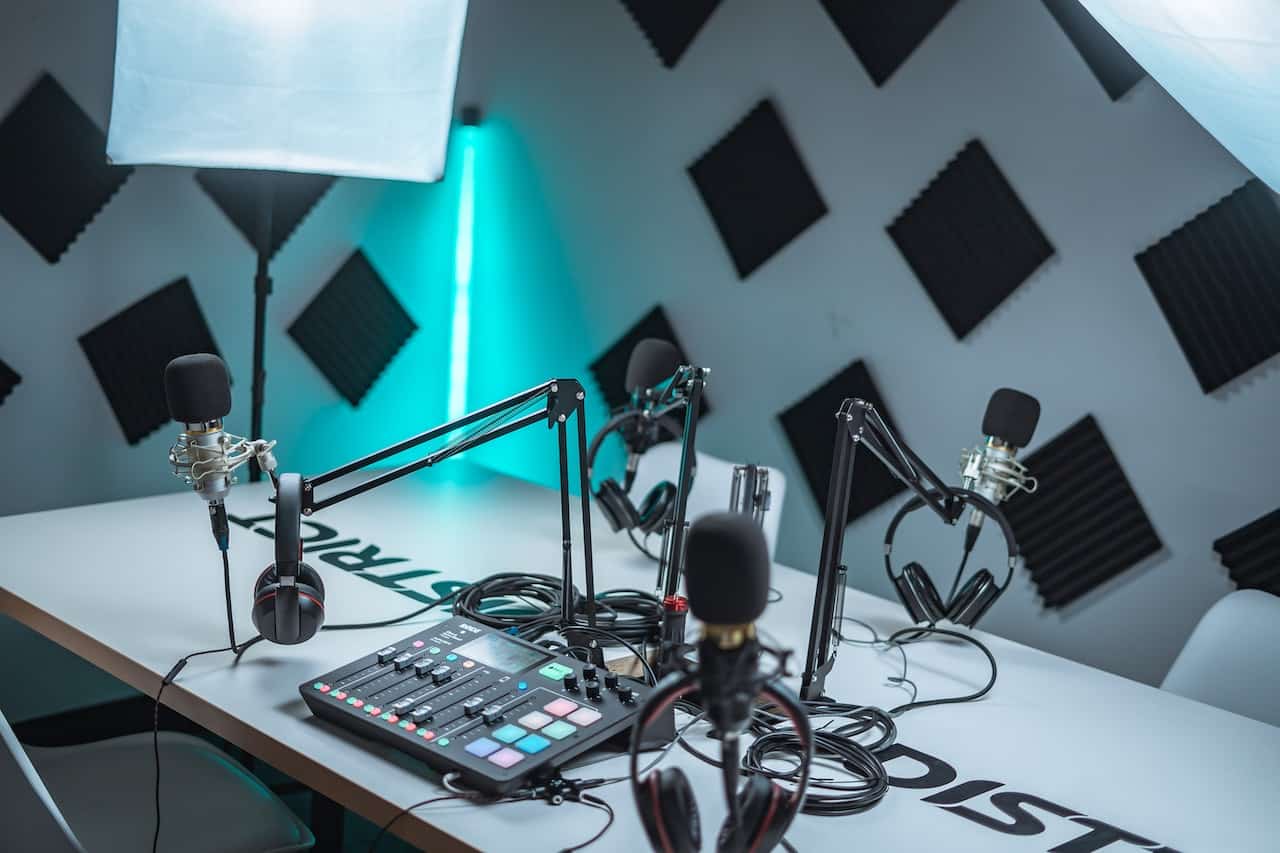
Does my Business Really Need a Podcast Studio?
You might be asking yourself, why do I need to build a podcast studio for my business?
Well, podcasts have been rising in popularity over the past decade, and now there are more than 2 million podcasts with 420 million podcast listeners worldwide.
The podcast industry is continuing to grow at an impressive rate and podcast ad revenues are expected to exceed $2 billion in 2023.
They are also easier than ever to listen to as mobile phones have become the primary device for podcast listening, 60% of podcast listeners are aged 35 or older.
By 2024 it is estimated that the podcast industry will be worth a staggering $4 billion.
There is an audience and listenership for practically every niche you can think of, that includes what your business does.
So, why wouldn’t you choose to build a podcast studio for your business and broadcast the extensive knowledge you have built up over the years to an audience who share the same passion for your subject as you do?
Become an Expert in Your Field – Create More Business
Creating a podcast of your own can be a great option if you’re looking to establish yourself as an authority in your space.
A great advantage of creating a podcast is that you’ll have the opportunity to build genuine connections with your listeners and strengthen greater brand awareness for your company.
Investing in a podcast is well worth the time and money if you want to share knowledge and create genuine relationships with potential customers – not just pay for advertising.
If you can build a successful podcast you will be seen as an industry leader – from there business opportunities and media work (which further promotes your brand) are all accessible.
Podcasts are an awesome content marketing tool.
One of the greatest benefits is that they can be incredibly specific, engaging only with those already interested in what you do.
Better yet – podcasting dovetails perfectly with lots of other digital and traditional marketing strategies! Whether it is Instagram, a blog or YouTube, podcasting can bring everything together under one umbrella.
If you already have an existing social media audience the transition from subscriber to listener and subscriber is pretty straightforward.
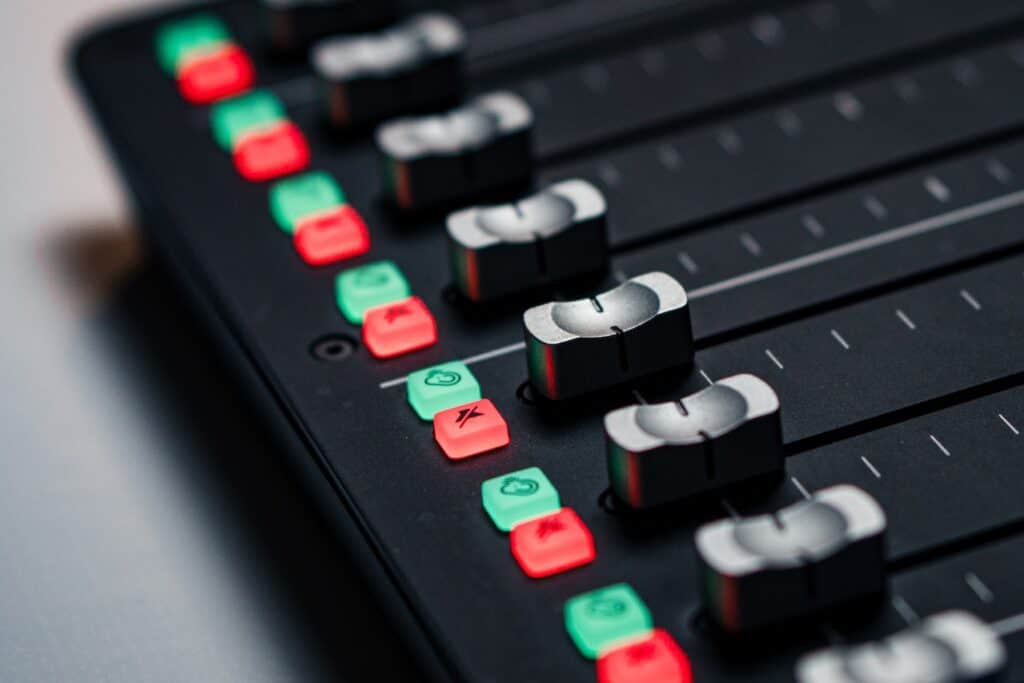
A Room with No View!
Finding the right room for your podcast studio is essential to getting good recordings.
You want to avoid a room with external walls, windows or noisy appliances that might interfere with the podcast and cause unnecessary background noise and echo.
If your business is involved in manufacturing or has a noisy factory environment, then it is probably best if you relocate your podcast studio as far away from your manufacturing facility as possible. Otherwise, the ambient noise may bleed into your recording.
The best podcast studios have carpet and soft furnishings – these will help absorb sound so it doesn’t bounce around in the space.
If you’re unable to find a room fitted with such materials, investing in some hanging soundproofing panels, a portable vocal booth or a microphone isolator may be necessary. That way, you can have some control over the quality of your audio output.
Laptop for Recording
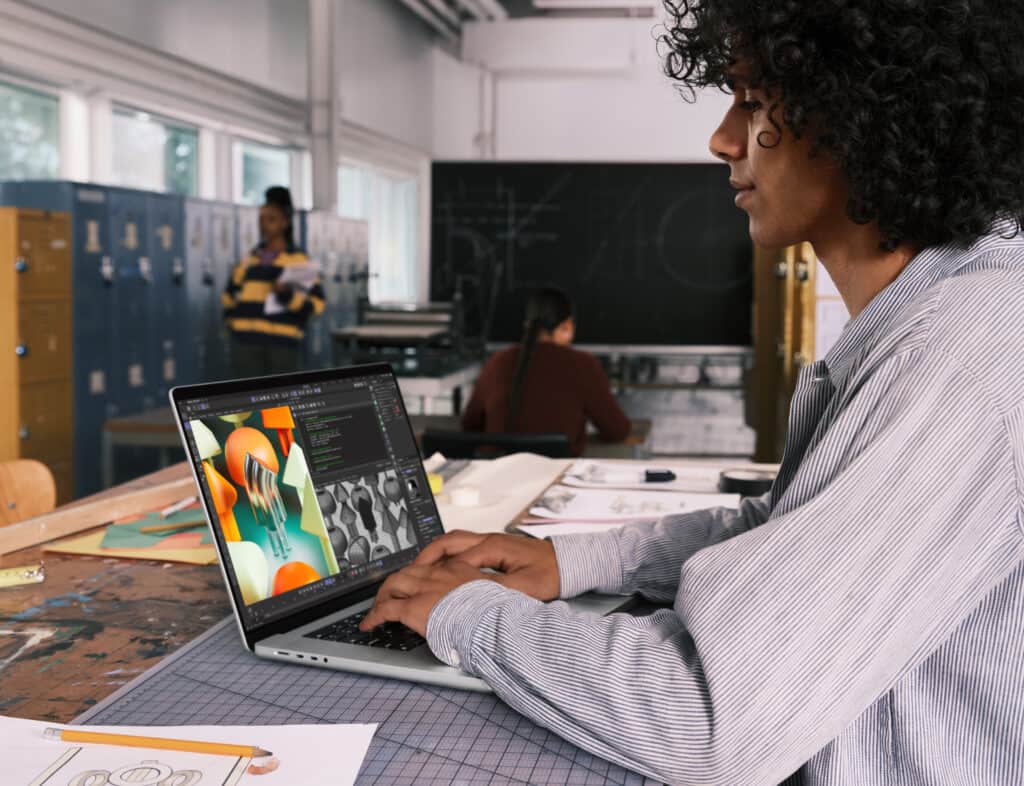
Working with a modern laptop to record your podcast is always a good idea.
Audio files can quickly fill up your disc space, so it’s important to have plenty – especially when you’re using your laptop as a podcast studio.
It’s a great idea to keep an external hard drive like a LaCie Rugged Mini on hand too, that way you’ll have an extra layer of protection and backup in case something goes wrong with your laptop storage.
Of course, make sure you grab one that’s quiet; fan noise is amplified through a microphone, so if your laptop fan is close by while you’re recording, it could interfere with the podcast.
If you already have a capable laptop, that’s perfect.
If not and you are a PC user, perhaps consider an Asus Zenbook Pro or if you are used to Apple products then the new Apple Macbook Pro is hard to beat.
Editing Software
Audacity
Audacity is a fantastic open-source audio recording software that offers so many benefits to its users.
This cross-platform software gives you the freedom of building a podcast studio without having to break the bank – as it is completely free!
It’s easily installable on all operating systems and comes with a variety of features, including multi-track editing, voice feedback, effects and so much more; giving the user an array of powerful tools all in one place.
If you’re looking for an affordable way to record audio, look no further than Audacity!
Try Audacity
GarageBand
Available on all Apple devices – iPhone, iPad or Macbook – GarageBand is an incredible free tool for anyone looking to expand their content creation into podcasting.
It not only serves as a podcast studio but also functions as a simple and powerful music-making app for beginners interested in playing tunes.
With GarageBand, you can easily create multiple podcast tracks that you can then mix and produce with professional results.
Not only that, but its user-friendly layout requires minimal musical knowledge or experience to understand and use all the features it offers.
Try GarageBand
Adobe Audition
If you are serious about your podcast and want to invest in audio editing software then Adobe Audition is the perfect program for podcasting and audio post-production.
It contains an impressive array of tools to quickly and easily record, edit and mix sound clips. With its intuitive design, Adobe Audition makes podcast production a breeze.
It’s got powerful features like multi-track recording, noise reduction, and multitrack mixing with realtime clip stretching that helps you bring your podcasting game to the next level.
And for podcast studios who are serious about sound quality, Adobe Audition offers top-end audio engine performance that can smooth out your podcast’s sonic flaws with surgical precision.
All in all, no matter what your podcasting ambitions may be, Adobe Audition has you covered!
Try Adobe Audition
Price – 7-day Free trial then £19.97 per month (based on an annual subscription)
Microphones
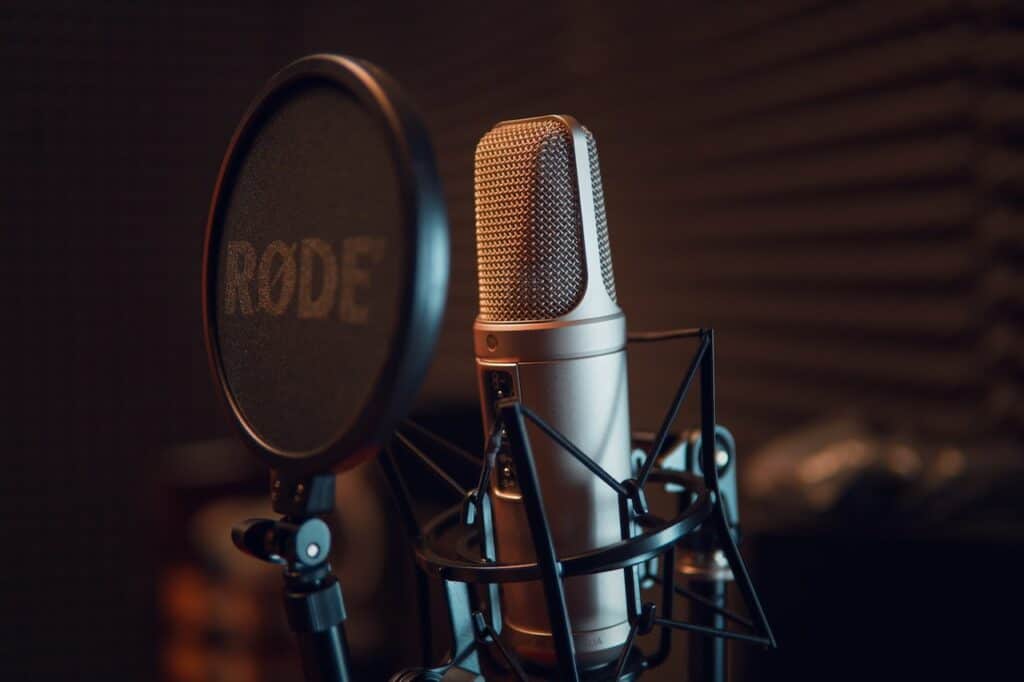
Dynamic Microphones
Using a dynamic microphone can be especially useful for podcasting in a studio setting.
Not only do they produce rich, high-quality sound compared to other digital microphones, but their internal construction makes them resistant to any external pops or disruptions that might come from another microphone.
Furthermore, their diaphragm assembly ensures that background noise is significantly reduced and the sound captured by the microhphone will be free of hissing or low rumbles.
Additionally, dynamic mics are relatively affordable which makes them an excellent choice for podcast studios looking to reduce costs while still getting professional audio quality they desire.
Condenser Microphones
A condenser microphone can provide a podcast studio with valuable clarity and sound accuracy.
Although more expensive, in comparison to other types of microphones, such as dynamic or ribbon mics, condenser mics often produce a cleaner frequency response which makes them ideal for podcast recording.
They also boast a far better signal-to-noise ratio than traditional mics, making it easier to pick up subtle nuances in audio.
Furthermore, condenser microphones are more sensitive and allow podcast hosts to record clear vocal recordings that won’t distort the sound too much at high volume levels.
In short, if you’re looking for excellent sound quality for podcasting purposes – by all means go ahead and invest in a condenser mic!
USB v XLR
USB microphones offer podcasting hosts a wide range of features and quality for those who need to record on the go.
While USB mics can be great for podcast interviews, the audio clarity will never be as good as an XLR microphone, which is important if you’re trying to create a professional podcast studio.
USB mics are better suited if you are budget conscious.
USB microphones can only record one channel of audio at a time so if you’re looking to interview multiple guests, an XLR system is your best bet for clearly capturing each guest’s audio and allowing for easy editing later.
Audio-Technica ATR 2100x
The Audio-Technica ATR 2100x has everything a new podcast host needs to set up their podcast studio.
Its wide frequency response produces clear and accurate sound, helping you capture even the softest of sounds with ease. This also serves you well in live streams, where it ensures your voice is heard loud and clear.
The cardioid polar pattern helps block out background noise effectively and its impedance reduction feature is perfect if you need to connect the microphone directly to laptops or other portable recording devices.
Plug-and-play makes setup quick and painless and a bundled desktop stand keeps it stable during your podcasting sessions.
All these features make the ATR 2100x an attractive choice for podcast studios.
AKG P120
AKG’s P120 is an excellent choice for podcast studios.
With its high-quality condenser microphone, this model is perfect for podcasting as it offers great sound clarity and sensitivity to capture all your podcast needs.
It even has a low noise floor to eliminate unwanted ambient sounds.
Additionally, the P120 comes with a switchable low-frequency filter which will help you isolate and manage vocal tones so that your podcast can sound professional.
All of these features make the AKG P120 ideal for podcasting studios providing podcast creators with the perfect environment to record stunning audio.
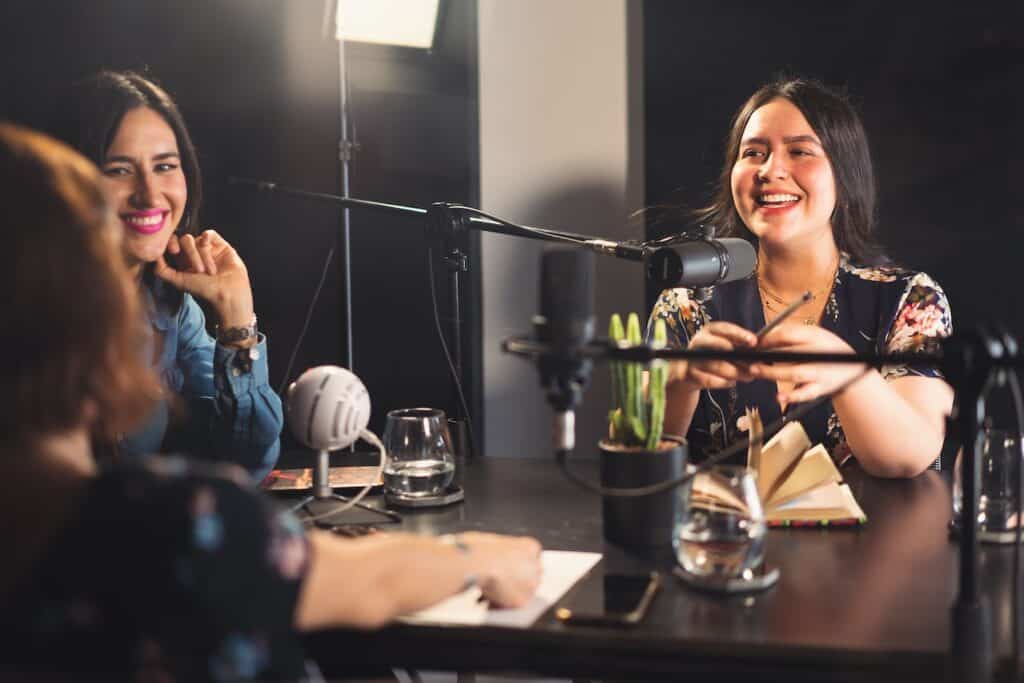
Rode Procaster
The Rode Procaster is a broadcast-quality podcast studio microphone, delivering superior sound quality at an excellent value.
Its built-in high-pass filter and the external pop filter take out any excessive noise, making sure all of your podcast audio is clear and professional-sounding.
It also has an internal shock mount to reduce noise from external sources such as equipment or even other podcast hosts in the same studio.
Combine all of those features with its durability and affordability, and you have yourself the perfect podcast setup!
Shure SM7B
The Shure SM7B is a powerful top-of-the-range microphone that can truly bring podcast studios to the next level.
This dynamic vocal mic will allow podcast hosts and guests to enjoy crisp and clear sound with minimal distortion, making conversations easier to hear and follow.
It has a precise mid-range presence bump which helps make voices sound genuine, so podcast hosts don’t have to worry about sounding over-processed.
The Shure SM7B is extremely durable, which makes it perfect for any podcast studio since it can withstand wear and tear from everyday use.
All in all, the Shure SM7B is an excellent microphone that can elevate your podcast studio in all the right ways!
Interface
Behringer UMC202HD
The Behringer UMC202HD interface is a great tool to have in any podcast studio.
It offers premium sound quality, with two inputs and four outputs.
With its reasonably priced USB output and plug-and-play performance, you can easily connect all of your essential podcast gear directly to the interface for an amazing podcasting experience.
It sports zero-latency monitoring abilities, so you will be able to hear yourself without delay as you record.
Additionally, the Behringer UMC202HD’s software looks sleek and operates smoothly, so podcast production becomes a breeze.
On top of all this, its robust and sturdy construction gives it a secure edge that’ll be sure to last!
Focusrite Scarlett 2i2 3rd Generation
The Focusrite Scarlett 2i2 3rd Generation interface is a podcasting powerhouse.
It provides clarity, depth and many other features that help podcast creators make beautiful recordings in their home studio. With the ability to record up to four channels at once, podcast producers can easily add in guests, interviews and more without having to buy expensive equipment.
The built-in preamps provide quality sound for both vocals and instruments that can easily be fine-tuned with its intuitive control knob.
The direct monitoring feature also allows podcast hosts to hear exactly what they’re recording in real time, allowing for uninterrupted recording and minimal setup time.
Clearly, the Focusrite Scarlett 2i2 3rd generation interface is essential for anyone looking to create amazing projects within their podcast studio.
Focusrite Scarlett 2i2 3rd Generation
Rode Rodecaster Pro II
The Rodecaster Pro II is a podcast studio game-changer!
This podcasting tool provides users with a range of features that make podcast production simple and straightforward.
Its combination of button panel, audio processing technology, and intuitive app allows podcast hosts to record like true pros.
Not to mention its ability to connect multiple audio sources, manage headsets, Bluetooth audio streaming, and multi-track recording make it a great choice for both newbies just starting out in podcasting and experienced pros alike.
With all of these functionality packed into one device — not to mention the fact that its already a cost-friendly option — the Rodecaster Pro II is an amazing podcast studio must-have!
Interviewing Guest Remotely
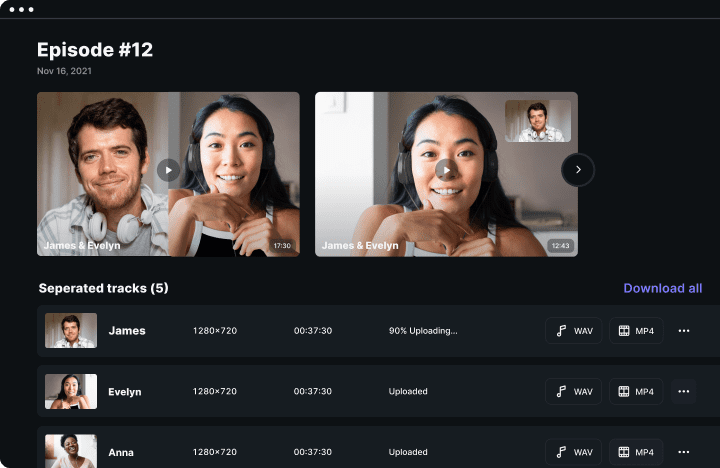
Riverside has revolutionised how podcasters interview their guests remotely.
This powerful application, which is backed by business powerhouse Gary Vanyerchuck and YouTube tech wizard, Marques Brownlee, allows users to interview guest remotely and record it all in stunning 4K resolution with impeccable audio.
The company have a range of pricing options, from a free, watermarked version up to a pro package at $24 per month.
Check out Riverside.
Podcast Studio Accessories
Setting up your podcast studio doesn’t have to be expensive, but the accessories you use do matter.
Investing in good quality headphones like Sennheiser HD 400s or Sony MDR-7506/1 is worth it if audio quality is important to you.
Quality XLR cables will also go a long way too and it’s better to pay a little extra for something good than deal with low-grade cables full of interference and feedback.
Don’t skimp on mic stands either as movement of the microphone can cause a whole host of issues during your podcast recording session.
Finally, using a mic pop filter will help cut out undesired humming and general noises which may occur when speaking directly into the mic.
All these items are available online separately and are very much worth investing in for podcast success!
Learn From Experts
As we’ve said already having a podcast dedicated to your company values and ethos makes a lot of sense, particularly as it is an up-and-coming form of media.
Take a look and listen to these four branded podcasts, all produced by recognisable companies sharing their insight to build brand value in their respective marketplaces.
1. Morgan Stanley – Access and Opportunity
3. Penguin Books – The Penguin Podcast
All have underlined that they are experts in their sector and can demonstrate it. Each of them has chosen this type of content creation to expand their marketing reach and position them as thought leaders in their markets.
This is a great way to show off your company’s expertise and build trust with your audience.
You can do the same.
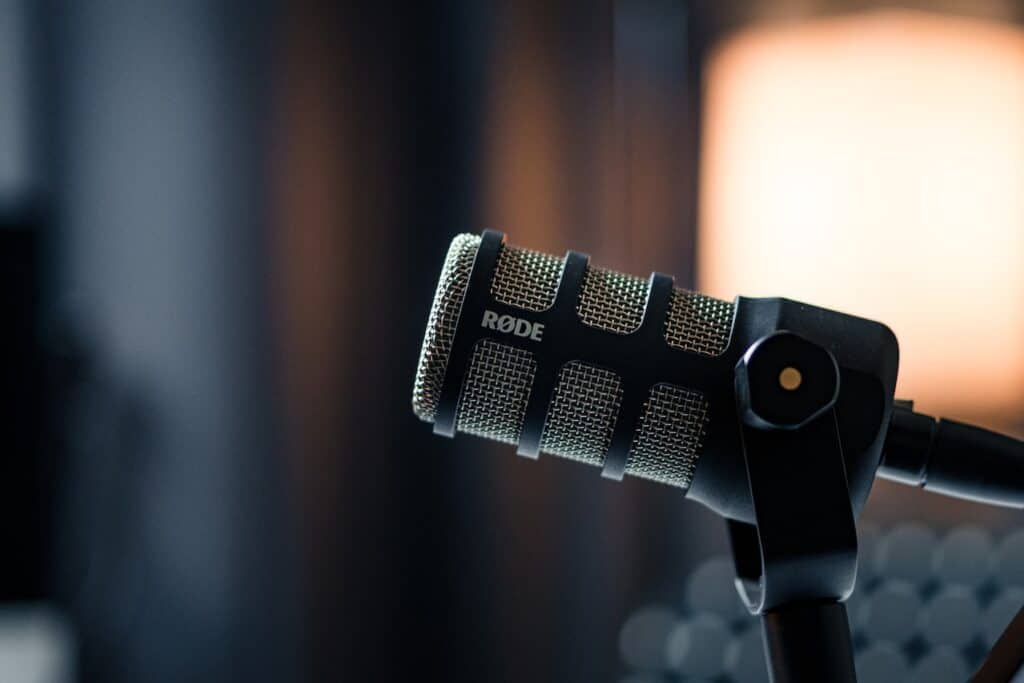
Conclusion
Podcasting is undoubtedly here to stay, and businesses of all sizes should consider utilising what this impressive medium can offer.
By launching a branded podcast, you can demonstrate your knowledge and expertise in your industry while also underlining your company brand.
Though it may seem daunting at first, building a quality podcast recording studio can cost far less than expected with the right hardware and prices are becoming progressively lower.
As always, results do not come immediately — an investment of both time and money will be necessary to build an audience and make your mark on the podcasting world.
If done correctly and with patience, it can also lead to other more mainstream media opportunities such as TV and radio.
So go grab your microphone and become part of the discussion and join an ever-growing number of companies that have already taken advantage of this rich media resource!




